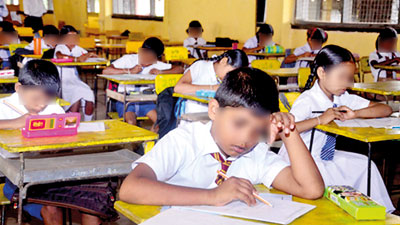News
Grade 5 scholarship exam: SC reprimands exams chief for abdicating decision-making authority
View(s):By Namini Wijedasa
The Supreme Court this week determined that the decision to award free marks for three compromised questions of the September 2024 Grade 5 Scholarship Exam was not in consonance with the rule of law and infringes the constitution as, in arriving at this solution, the Commissioner General of Examinations (CGE) had abdicated his decision-making authority to the Prime Minister, who is also the Minister of Education, and the Secretary to the Education Ministry.
Justice Yasantha Kodagoda, PC, with Justices Kumuduni Wickremasinghe and Arjuna Obeyesekere agreeing, held that, pursuant to the Prime Minister convening a meeting on September 26 last year, the CGE “has abandoned the internal decision-making process he was involved in, and has abdicated that role to the Honourable Prime Minister/Minister of Education and the Secretary to the Ministry”.

“Though both the Honourable Prime Minister/Minister of Education and the Secretary to the Ministry may not have intended to take away from the CGE his decision-making authority or to influence the process, that has been the effect of their involvement,” the judgment states.
“Furthermore, in the totality of the circumstances referred to above, it is evident that the impugned decision to award free marks to the three compromised questions (which to date according to the Solicitor General has not been documented by the CGE in any official file) has not been taken independently by the CGE founded upon the inherent discretionary authority vested in him by the governing law,” it holds, while observing that the CGE has failed to adduce any valid reason for not having recorded his purported decision.
The judgment, delivered on Tuesday, pertains to four separate applications filed in the Supreme Court in October 2024. The Court consolidated them, with counsel requesting one decision to address all.
The Court also observed that the Grade 5 Scholarship Exam was crucial for selecting talented students for admission to prestigious public schools and awarding bursaries to financially disadvantaged students. And it held that judges will not interfere in matters in respect of which they don’t have expertise, unless there is an illegality.
All counsel agreed with each other, and the Court concurred, that it is the CGE who is “vested with the power to decide on the designing or causing the designing of possible solutions to a problem that has arisen (such as the one relating to the breach in the confidentiality of the 3 questions of Part I of the Grade 5 Scholarship Examination), deciding on a solution to be implemented, and the implementation of the identified solution.”
As pointed out by the Solicitor General (SG), “it is undeniable that both the Minister and the Secretary to the Ministry of Education would indeed have general administrative superintendence” over the CGE.
“This does not mean that the public functionary cannot engage in a process of consultation with the Minister or the Secretary, subject to the important caveat that the final decision must always be that of the public functionary who is required by law to take such decision,” Justice Kodagoda maintains.
“When power is vested by law either directly or indirectly on a public functionary to perform a function for the purpose of achieving a particular objective, unless otherwise specifically stated, that public functionary must take independent decisions by himself and no one else may decide on his behalf,” he holds.
“Such public functionary being assisted in the decision-making process and being guided by expert opinion is not a violation of the law,” he elaborates. “Nor would the law be violated by supervising the functioning of the public functionary or exercising superintendence, should such power (as in the instant case) be vested in a higher authority.”
“However, both political and administrative functionaries (such as the Minister or the Secretary to the relevant Ministry) who exercise supervisory authority or superintendence over such public functionary shall not unless specifically authorised by law, in any manner influence the decision-making process or the decision itself adopted by the public functionary on whom the governing law has conferred legal authority to take decisions.”
“In view of the foregoing, the Minister of Education or the Secretary to the Ministry of Education must restrict their influence over the decision-making process so that the Commissioner of Examinations retains his independence to perform the legal duty of decision-making and in that regard being able to independently exercise discretion,” the Court states.
The best way to say that you found the home of your dreams is by finding it on Hitad.lk. We have listings for apartments for sale or rent in Sri Lanka, no matter what locale you're looking for! Whether you live in Colombo, Galle, Kandy, Matara, Jaffna and more - we've got them all!

